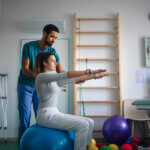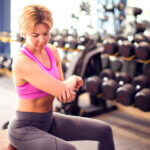The ball of the shoulder joint is held in the socket of the joint by a powerful group of muscles and tendons known as the rotator cuff. The rotator cuff helps keep the shoulder joint in place while providing it with a full range of motion so you can lift your arm over your head and reach behind your back.
An injury to the shoulder or degenerative conditions can cause the rotator cuff to tear. Some tears are partial tears to the tendons that strain the connection of the rotator cuff to the bone. Other tears are complete tears, which fully separates the tendon from the bone.
Symptoms of a torn rotator cuff
A torn rotator cuff can affect people in different ways but usually, its symptoms include:
- Dull, persistent pain in the shoulder
- Weakness in the shoulder
- Limited range of motion
- Limited use of the shoulder and arm
- Pain at night when lying on the shoulder
Some soreness in the shoulder is normal after physical activity, but if you experience any of these symptoms for an extended period of time or if you have weakness after an injury, you may need professional health care assistance.
Treatment for a torn rotator cuff
Treatment for a torn rotator cuff varies depending on its cause and severity. Often, your health care provider will ask you to rest and limit the use of your arm, especially with activities that involve reaching over your head.
In many cases, physical therapists will help you recover from a torn rotator cuff. Physical therapists can guide you through exercises and stretches that improve your strength and flexibility. This can reduce pain in the shoulder, improve its range of motion and help prevent future tears from developing.
Sometimes, surgery is necessary for complete tears. Physical therapists still help in these cases by assisting in pre-op preparation and post-op recovery.
Visit Peak Performance Sports and Physical Therapy today for torn rotator cuff treatment
Do you display any symptoms of a torn rotator cuff? Our physical therapists at Peak Performance Sports and Physical Therapy can help you recover. Contact us today to learn more about torn rotator cuff treatment or to schedule an initial appointment.







